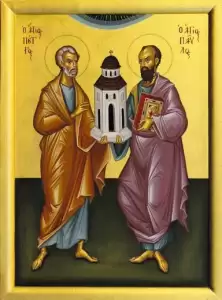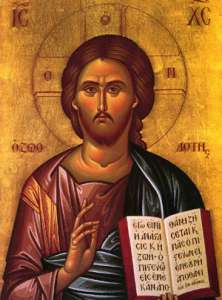Warning: Undefined array key "margin_above" in /home/stscahvallejo/public_html/wp-content/plugins/ultimate-social-media-icons/libs/controllers/sfsiocns_OnPosts.php on line 652
Warning: Undefined array key "margin_below" in /home/stscahvallejo/public_html/wp-content/plugins/ultimate-social-media-icons/libs/controllers/sfsiocns_OnPosts.php on line 653
Let mercy outweigh all else in you. Let our compassion be a mirror where we may see in ourselves that likeness and that true image, which belongs to the Divine nature and Divine essence. A hard and unmerciful heart will never be pure.
St. Isaak the Assyrian
October 2022
For Sunday, October 2
What is a merciful heart?
And what is a merciful heart? It is the heart's burning for the sake of the entire creation, for men, for birds, for animals, for demons and for every created thing; and by the recollection and sight of them the eyes of a merciful man pour forth abundant tears. From the strong and vehement mercy which grips his heart and from his great compassion, his heart is humbled and he cannot bear to hear or see any injury or slight sorrow in creation.
For this reason he continually offers up tearful prayer, even for irrational beasts, for the enemies of the truth and for those who harm him, that they be protected and receive mercy. And in like manner he even prays for the family of reptiles because of the great compassion that burns in his heart without measure in the likeness of God.
- St. Isaac the Assyrian, Homily 81
 Epistle Reading
Epistle Reading
The reading is from St. Paul's Second Letter to the Corinthians 6:1-10
Brethren, working together with him, we entreat you not to accept the grace of God in vain. For he says, "At the acceptable time I have listened to you, and helped you on the day of salvation." Behold, now is the acceptable time; behold, now is the day of salvation. We put no obstacle in any one's way, so that no fault may be found with our ministry, but as servants of God we commend ourselves in every way: through great endurance, in afflictions, hardships, calamities, beatings, imprisonments, tumults, labors, watching, hunger; by purity, knowledge, forbearance, kindness, the Holy Spirit, genuine love, truthful speech, and the power of God; with the weapons of righteousness for the right hand and for the left; in honor and dishonor, in ill repute and good repute. We are treated as impostors, and yet are true; as unknown, and yet well known; as dying, and behold we live; as punished, and yet not killed; as sorrowful, yet always rejoicing; as poor, yet making many rich; as having nothing, and yet possessing everything.
What does it mean to have nothing but possess everything?
It could happen that some public official would say to a Christian: “Either you will stop being a Christian, or, if you persist in being one, you shall have no house or property.” That will be the time when those rich men, who had decided to keep their riches in order to win merit with God by using them for good works, will choose to give them up for Christ’s sake rather than Christ for their sake… Thus they become as men “having nothing, yet possessing all things” —and everlasting life in the world to come, lest by giving up Christ for the sake of riches they be cast into everlasting death.
St. Augustine - Letter to Hilarius
Questions:
- What is the difference between something being useful vs. being valuable. Some things are important, useful and needed for us while we are alive on this earth. But are they truly valuable? Is there anything more valuable than our souls and entering the Kingdom of Heaven when we die? How can we make sure we remember what is useful on earth vs. what is truly valuable?
 Gospel Reading
Gospel Reading
Luke 6:31-36
The Lord said, "As you wish that men would do to you, do so to them. If you love those who love you, what credit is that to you? For even sinners love those who love them. And if you do good to those who do good to you, what credit is that to you? For even sinners do the same. And if you lend to those from whom you hope to receive, what credit is that to you? Even sinners lend to sinners, to receive as much again. But love your enemies, and do good, and lend, expecting nothing in return; and your reward will be great, and you will be sons of the Most High; for he is kind to the ungrateful and the selfish. Be merciful, even as your Father is merciful."
What does it mean to love your enemies?
The apostles were about to be sent out to preach and many persecutors and plotters awaited them. If the apostles were fearful and dismayed by persecution, they might want to protect themselves from their persecutors by keeping silent and not teaching. If that happened, the radiant sun of the Gospel would be extinguished. In anticipation of this, the Lord exhorts the apostles not to give way to defensive measures against their enemies, but instead bravely to endure all things, even insults and murderous plots. This is what He Himself did on the Cross, saying, "Father forgive them, for they know not what they do" (Luke 23:23). To prove to the apostles that this commandment to love one's enemies is possible to keep, He then says, "What you want to be done to you, do the same to others; and be to others that kind of person you want others to be to you". If you want your enemies to be hard, unfeeling, and angry towards you, then be the same yourself to them. But if you want them to be kind and compassionate towards you, and not to remember wrongs, do not think that it is impossible for you yourself to be the same towards them. Do you see this natural law which is written in our hearts? That is why the Lord also said, "In those days I will surely put my laws into their mind, and write them on their hearts" (Jeremiah 38:33). Then He adds another compelling reason to keep this commandment: if you love those who love you, you are like the sinners and the Gentiles; but if you love those who do evil to you, you are like God, "Who is kind unto the unthankful and to the evil." Which do you desire, to be like sinners, or to be like God? Do you see the divine teaching? First He persuaded you by means of the natural law: what you want to be done to you, do to others. Then He persuades you with the result and the reward - He promises that you will become like God.
- Blessed Theopylact - The Holy Gospel According to St. Luke
Questions:
- Can you remember a time when someone offended you? Have you forgiven them? If yes, was it hard to do? If not, why not?
- What are some ways we can have the love of Christ in our hearts so that we can be like God?
![]() The Liturgy of the Catechumen
The Liturgy of the Catechumen
The first part of the Divine Liturgy is also called the Liturgy of the Catechumen. The catechumen were those who were being prepared to join the Orthodox Church, having come from various spiritual backgrounds, they spent a considerable time learning the Orthodox Faith and attending the worship services. However, they were only allowed to attend the first part of the liturgy and, being prayed for by the faithful through special petitions, the catechumens were then dismissed after hearing the Gospel and sermon. The reason was that because they had not yet been baptized and joined to Christ, they were unable to therefore partake of the Holy Body and Blood of Christ. Since the whole point of attending the Divine Liturgy is to receive Holy Communion, it was not proper for them to remain in the church.
In the true sense of unity and singularity of the One, Holy, Catholic and Apostolic Church, only those who were Orthodox were allowed to remain in the worship and receive Holy Communion. Because Holy Communion is both an expression of our unity and also what unites the people of God with both Christ and with one another; thereby manifesting that unity. Because it is the Holy Blood of Christ that flows through us all and makes us spiritual brothers and sisters of one another, of Christ the Son of God, and therefore sons and daughters of God as well. Being able to remain in the church to worship and receiver Holy Communion was therefore seen as a great privilege and blessing.
No peace without Unity
But how can there be unity if there is no peace between man and God; between the priest and the parishioners; between the parishioners in the church; between husbands and wives, between siblings; between relatives, between friends? For this reason, the first three petitions of the liturgy all compel everyone towards peace.
"In peace let us pray to the Lord, let us pray to the Lord."
"For the peace of God and the salvation of our souls, let us pray to the Lord"
"For peace in the whole world, for the stability of the Holy Churches of God and the unity of all, let us pray to the Lord."
It's so important then that as we stand in the church praying to God for peace, that we have peace in our hearts as well. If we are in the midst of a conflict with someone or if we are holding a grudge or if we have not forgiven someone or if our mind is full of anxiety and stress about something, then we cannot pray "in peace" to the Lord. For this reason, it is so essential to first truly be at peace with all people by forgiving and letting go of our anger, pride and ego. And in that moment when we walk into the church, to let go of everything worldly that is weighing us down so that we can receive God's peace into our hearts and minds through the Holy Spirit who comes and desires to enter us in the worship services.
How can this happen? It happens when we open our hearts to God in our private prayers before coming to church, such as the pre-communion prayers. We can ask Him to heal our hearts and minds, to forgive us, to forgive those who hurt us, to have mercy on all of us, and to give us the ability to both pray in peace and receive His peace. However, there is is one more thing needful: before we can receive God's peace, we must offer him our repentance through the Sacrament of Confession. Holy Confession is the sacrament of healing, because it heals both the soul and our relationship with God that was ruptured by sin. It is essential and something required for those who wish to attain forgiveness and peace and approach Holy Communion in a prepared and worthy manner.
After the first petition of "In peace, let us pray to the Lord," we sing the short prayer, "Lord, have mercy" or Kirie Eleison. The Greek word for mercy is eleison and it is based on the word έλαιο (elaiyo) which means oil. In the ancient world, oil was one of the primary medicinal remedies for healing wounds. In Aramaic, the word for mercy is rakhem, which can also mean to love. So the essence of our prayer, "Lord, have mercy" is that we are asking our Lord to forgive us our sins and to heal the wounds of our souls through his love.
Let's listen to and learn the shortest but most important prayer that we continually sing in the Divine Liturgy.
- Click the button below to download the sheet music.
- View or print out the sheet music.
- Click Track 3 - Lord have mercy below to listen to it chanted. Try to learn it and sing-along!
 Great Martyr Theodore Gavras of Atra
Great Martyr Theodore Gavras of Atra
Theodore was born in the eleventh-century city of Atra of Chaldia. His pious and illustrious parents raised him in piety and privilege, and he ardently pursued the teachings of Christ, wanting to be a witness for Christ. He was also a protector of the poor and innocent. Theodore became a general and ruler of Chaldia, Trebizond, and Coloneia. He had courage and understanding, and rulers and emperors praised him and sought to be in his company. Theodore developed a great desire to become a martyr for Christ. Emperor Manuel I and his cousin, the apostate Andronikos Komnenos, became allies with the Emir of Melitine, and they overran many areas that Theodore governed. Theodore killed the Emir and many of his men. However, he was taken captive by Amir Ali, who demanded that Theodore renounce Christianity. Theodore stood fearless and said that nothing earthly would entice him to deny Christ and with a loud voice, he began to preach Christ. For this, Theodore was viciously tortured but remained steadfast. He thanked God for being able to enter the contest of a martyr and prayed for strength. Theodore's lounge was severed, and his eyes gouged, yet Theodore miraculously continued to speak and glorify Christ. His limbs were cut off and burned, and in the end, he was thrown into a furnace, but the flames seemed cool to him, and he continued to glorify Christ until he gave up his spirit. Amir Ali had Theodore's head enshrined in a golden vessel to remind him of the saint's supernatural bravery. Theodore's miracle-working relics came to rest at a church dedicated to him. (Source: Orthodox Lives of the Saints)
In the life of St. Theodore above, we read how he desired earnestly to become a martyr for Christ. When Christianity was legalized and the official persecution of Christian stopped in the year 313 AD, devout Christians continued to desire to grow in their zeal for Christ and to express it in that ultimate way of martyrdom. However, the legalization of Christianity ended the possibility of martyrdom and, some would say, this affected the fervor, faith and zeal of Christians. In response to this, the desire to keep the zeal of the martyrs alive is what compelled the first men and women to go out into the desert to dedicate themselves to a "bloodless martyrdom": a life devoted entirely to ascetically feats of prayer, fasting and poverty, modeling themselves after St. John the Baptist.
Nonetheless, we know that even after the legalization of Christianity with the Edict of Milan in 313AD, Christians continued to suffer martyrdom for simply for being Christians and preaching Christ for many more centuries. And the same is true to this day. While we may not know if one day we will be openly persecuted, imprisoned or killed for being Christians, we have to commit to the "bloodless martyrdom" of the Orthodox spiritual life which consists of prayer, fasting, good works and self-control. Those who achieve the purity of the heart and mind through spiritual struggle will be crowned as martyrs.
Thank you for participating in SOFIA! If you've subscribed to our newsletter, look for an email notification next week when a new lesson page is posted. See you Sunday!

 Weekly catechism and spiritual devotion for the Orthodox home
Weekly catechism and spiritual devotion for the Orthodox home